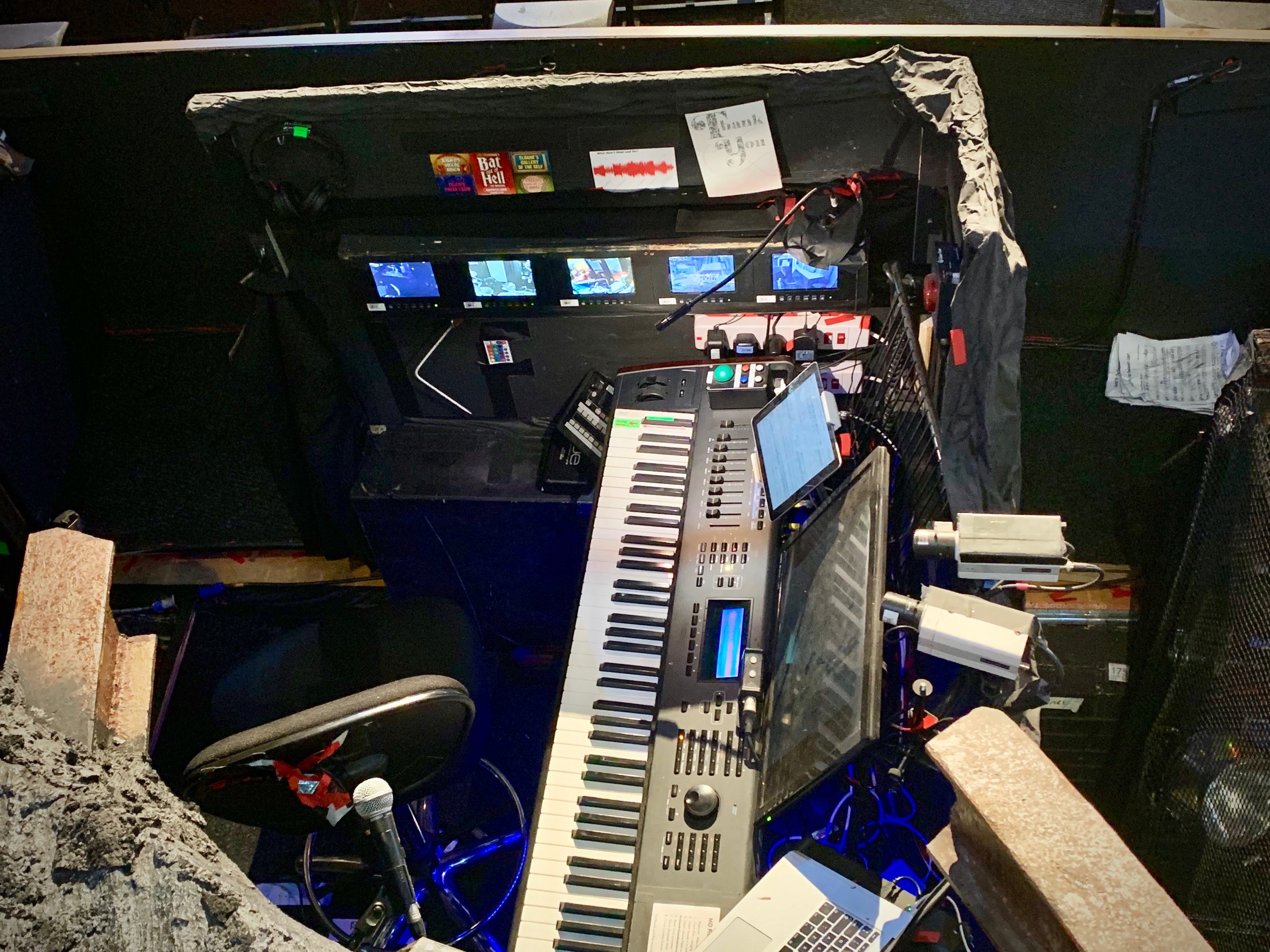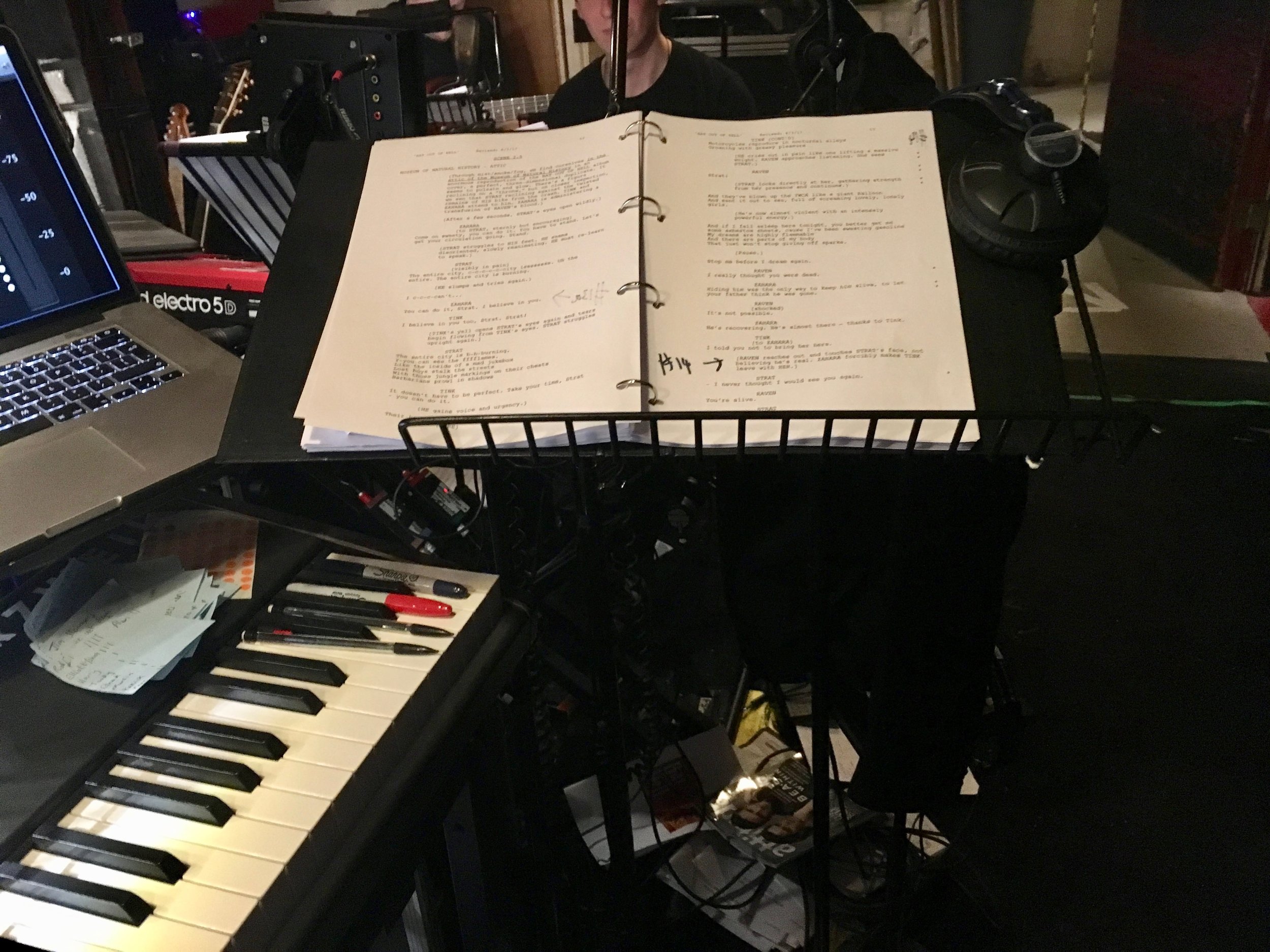Working in a Gordon Ramsay restaurant is the culinary equivalent to a jukebox musical. When you are eating your white truffle and gold pizza, you know full well that the King of TV bleeps didn't actually cook it; but it's his name above the door, and that's probably the reason you chose that establishment over the independent restaurant next door. So when you go to see Bat out of Hell the musical, you shouldn't expect Meatloaf to be acting, singing and dancing, nor it's creator Jim Steinman conducting the band. No. That bit is my job.
Since December 2016, my life has been full of bats and statements about doing anything for love with clauses attached. I've loved almost every minute of it, but theatre is much harder work than you'd expect.
So what goes on behind the scenes? In short, anything and everything. I know this answer is worthy of being in a script of 'Neighbours', but one mustn't forget that the creative people who work in this industry are not only creative on the stage, but off it as well! In the past two years, I've dealt with countless showmances, mid-performance panic attacks and loss of voice, broken bits of body, actors not entering on stage because they were trying out the new poo pourri in the toilet, or even actors entering on stage at the right time but not in the right location. I've had musicians not arriving until well into act one or simply forgetting to play as their auto-pilot has failed them; the list goes on. I've even conducted a performance with a bucket next to me in case what happened before the show decided to continue during it.
Is that list shocking to you? Probably, but it shouldn't be. How many times in a 'normal' workplace has someone fallen ill during a meeting, or walked out because they didn't like the colour top you wear, or simply failed to turn up at all. It's life. The only difference is us creatives are there to display ourselves shamelessly to people who pay to observe. And as I'm Teacher today, the word 'Creatives' usually describes the collective gaggle of Directors, Supervisors and Designers of this world but not the actors; but here and now I include actors and musicians as well because I believe once in a while they can be creative too.
I start my day at work checking in with the Company Manager. Her job is to keep the company of people working in the building happy, professional, efficient, and working well so that the people working outside of the building would be proud. I check who is off, if things need altering because of the absentee, and who is on but not feeling on top form. I then look at the noticeboard side of stage. Sometimes there are speeches I need to be aware of, or a set piece isn't working as it should. The only predictable element in theatre is that it's unpredictable.
Once those checks are complete, it’s time to warm up the cast. The vocal and physical takes about 30 minutes; and if you think I lead or even partake in the physical, you apparently don’t know me. I like exercising about as much as I like a two-day-old cheeseburger from the golden arch. The warmup is the only point in the run of a show where everyone gets together, so it’s also a continuous bonding exercise. The musicians don’t do this. They are lonely bastards who either don’t need supervision with their warmup or feel they are always warm anyway.
After this, it’s T-minus one hour until curtain up. Most people spend 25 mins or so grabbing some food. Some who have heavy makeup, wigs or costume need this time to prep. At 35 minutes to curtain, the DSM (Deputy Stage Manager) calls over the backstage tannoy ‘the half’; that means we have thirty minutes until beginners; and no, his watch isn’t fast. We always work 5 minutes ahead of time, so for a 7.30pm performance, ‘beginners’ are called at 7.25pm in the hope that we run on time. This is when I make my way down seven floors from my dressing room at the Dominion theatre to the pit - the adequately named space for the musicians.
Hopefully, all of the players are in situ. In Bat out of Hell, the stage design is such that we can’t use all of the pit (thank you Jon Bausor!), so the people who hit things for a living are in purpose-built booths under the stage. The only way I can see them is with a camera, and they have a screen of me.
Once I’m on the podium, I feel a little bit like a captain doing his pre-flight checks:
Does my monitoring system work? Without this, I wouldn’t be able to conduct the show as I’m plugged into headphones for the whole performance.
Are my keyboards and pedals working? I have had my keyboard break mid-performance with the sound team clambering around me while conducting to get it back up and running ASAP.
Does the c***k work? Sorry. Stop there a minute. The play you’re not supposed to mention by name, Macbeth I think it’s called, has a similarity to the word c***k in musical theatre. Oh, I may as well say it. Click. There. I did it. Click. Clickety-click. So why is this word the ‘Scottish play’ of musicals and what does a click do?
The click is simply a metronome played into my ear which I follow with my conducting. This doesn’t go out to the audience (that would be a tad annoying), but what does run alongside the click can be many things to make the performance tighter. Some productions have certain music on click, drums or effects for example; we don't have that on BOOH. Some productions use it to time preprogrammed lighting and projections to the music; we do have that on BOOH. If we want an explosion to happen at a point in the music, with a lighting and video effect, 'click' is the perfect tool to sync them all together. So far so good then. So why is this a contentious subject? Well, because sometimes we add vocals to a click.
There. I said it. Some people see this as cheating and therefore should be something that is secret. Except theatre is cheating; it’s all one big cheat. If a bike explodes on stage, I hate to tell you this, but it didn’t really explode. It’s a craft; magic if you will. If someone gets shot on stage, or even worse, a rather large light fitting from B&Q swings dangerously over the audience, then fear not because it’s passed all checks and is probably more secure than my sitting-room light from the Mr Light shop down the road...
So why would we prerecord vocals? Well, creating theatre is about making the impossible possible. And sometimes, our incredible choreographers need the actors to dance in such a way that to sing to the best of their ability is simply impossible; so they prerecord tracks to help them keep the standard for the audience, regardless if you’re seeing show number one in a week, or number eight. It's always there to support, not replace live singing. So is it cheating? Is it wrong? Yes and no in that order. And to be clear, it’s usually the ensemble backing vocals that are supported and not the lead singer.
So after the preflight check, what happens next? Read more about mad drummers, flying bats and what a conductor really does in part two here…
Book recommendations discussing theatre and the mystery of backstage
Everything You Always Wanted to Know About Going to the Theatre (But Were Too Sloshed to Ask, Dear) - a fun, tongue in cheek, medium length book.
London Theatres - a fascinating and detailed hardcover book by leading theatre critic Michael Coveney.
Theatreland: A Journey Through the Heart of London's Theatre - a hardback book covering the five centuries from Shakespeare’s playhouses to today’s West End
Musicals: The Definitive Illustrated Story - a hardcover book taking you through a journey from Les Mis through to Mary Poppins
Musical Theatre: A History - a decent length paperback book which is more academic and detailed in style



















Robert Emery talks to Fred and Richard Fairbrass, the brothers better know as Right Said Fred. They talks about selling 30 million albums, how they dealt with their massive success, their struggle with depression, and how on occasion, they like to live life to the max; including buying a fridge so big it wouldn't fit inside the house!